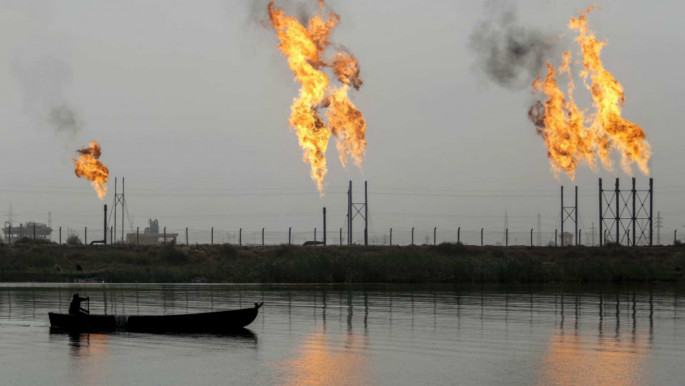
Iraq's protests are about more than corrupt elites
While corruption and the absence of basic services have been singled out as the main reason motivating demonstrations, this instability is also the byproduct of escalating global warming and drought in Iraq.
Increasingly extreme weather conditions are likely to translate into more violence in Iraq in the medium term, leading to questions over whether Basra risks a situation akin to Deraa, the cradle of Syria's revolutionary protests in 2011.
Since 8 July, demonstrations have taken southern and central Iraqi regions by storm, their epicentre the oil-rich port city of Basra.
Basra produces over 70 percent of Iraq's hydrocarbon output but the southern city is plagued by corruption, pollution, catastrophic infrastructure and its formerly handsome canals have been turned into open sewage.
But Basra is also the heartland of South Iraq, which besides being a large producer of oil is home to farmer communities dependent on irrigation from the Tigris and Euphrates rivers, according to a 2012 report by the FAO.
The report estimated that the sector provided 20 percent of employment in Iraq and that one third of Iraqis residing in rural areas depended upon agriculture. According to Reliefweb, 39 percent of the country's surface is estimated to have been affected by desertification, with an additional 54 percent under threat.
In 2017 Hassan Janabi, the country's water resources minister highlighted that farmers protests in southern Iraq were due to water scarcity which prevented them from planting the winter's wheat crop. By the following summer, the minister warned that even drinking water may be in short supply in some areas.
 |
Iraq is considered one of the Arab region's most vulnerable countries to climate change |  |
He was right, media reports underline that the spark for the current protests in Basra was a brawl between a young man from a village north of Basra and the owner of a water tanker whom the young man thought was overcharging.
Iraq is considered one of the Arab region's most vulnerable countries to climate change, with a higher frequency and intensity of extreme weather events and rising environmental degradation.
"Increased temperature levels, reduced precipitation, more days with high temperatures and drought are all evidence of climate change in Iraq," warns Dr Azzam Alwash, founder of the Iraqi Society for the Protection of Nature.
However, he also explains that Iraq is largely reliant on rain that falls outside its borders for more than half of its water supplies, namely in Turkey, Syria and Iran, which feed the Tigris and Euphrates Rivers. Dams in Turkey and Iran have translated in a significant drop in water levels in Iraq.
 |
|
| Basra produces over 70 percent of Iraq's hydrocarbon output, but the southern city is plagued by corruption [AFP] |
Turkey has built over 600 large dams, including dozens of major ones near the Iraqi and Syrian borders. "The problem in Basra has been compounded because the city sits downstream which means that other Iraqi governorates that sit upstream are taking a larger share of water.
"In addition, southern Iraq falls below sea level which means that there is salinisation of agricultural soil, a trend also worsened by Iran diverging of the Karun river," he adds.
Escalating temperatures are only making matters worse. An NBC report placed Baghdad - Iraq's capital - as the hottest city in the world in 2015, reaching around 50 degrees centigrade.
Read more: Hassan al-Janabi: 'We want Turkey to help develop water resources in Iraq'
This year, temperatures in Basra were around 48 degrees for days at a time, which crippled the electrictricity grid. The power outages meant many residents had electricity for only a few hours a day and no air conditioning.
This combined with Iraq's rampant corruption and the lavish lifestyle of its political elite is fueling the anger that led to July's demonstrations.
 |
|
The link between weather conditions and conflict has been the subject of extensive research. One study conducted in sub-Saharan Africa concluded there was a significant association between warmer temperatures and civil war, with an astonishing 54 percent increase in armed conflict predicted in Africa by 2030.
Climate change appears to be worsening security challenges in developing countries, especially those with large farming communities, also putting Iraq at risk.
"If the status quo remains, agriculture in Iraq will die, the situation is not sustainable. Farming is the livelihood for many there and worsening conditions will mean waves of migration towards big cities plagued by unemployment and absent services which will lead to more unrest. Global warming and water scarcity is a real problem and a major threat for Iraq," warns Alwash.
The Iraqi government should heed this expert's warning. After all, Syria's deadly unrest was triggered in part in Deraa, where large numbers of unemployed farmers congregated in the wake of the post-2007 drought that hit Syria.
While the triggers of the Syrian civil war are clearly complex and multiple, the effects of climate change - worsened by an inadequate response on the part of authorities - contributed to civil unrest. Today, similar conditions appear to be feeding into another wave of unrest in nearby Iraq.
Mona Alami is a French-Lebanese analyst who writes about political and economic issues in the Arab world. She is a nonresident fellow at the Atlantic Council's Rafik Hariri Center, and the King Faisal Center for Research and Islamic Studies.
Follow her on Twitter: @monaalami
Opinions expressed in this article remain those of the author and do not necessarily represent those of The New Arab, its editorial board or staff.




